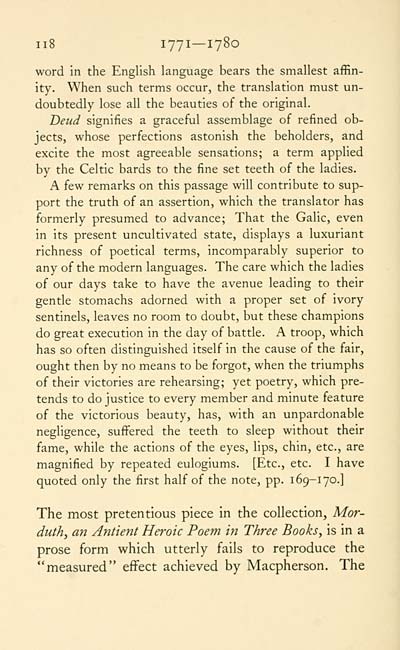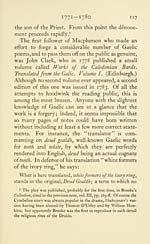Download files
Complete book:
Individual page:
Thumbnail gallery: Grid view | List view

ii8 1771— 1780
word in the English language bears the smallest affin-
ity. When such terms occur, the translation must un-
doubtedly lose all the beauties of the original.
Deud signifies a graceful assemblage of refined ob-
jects, whose perfections astonish the beholders, and
excite the most agreeable sensations; a term applied
by the Celtic bards to the fine set teeth of the ladies.
A few remarks on this passage will contribute to sup-
port the truth of an assertion, which the translator has
formerly presumed to advance; That the Galic, even
in its present uncultivated state, displays a luxuriant
richness of poetical terms, incomparably superior to
any of the modern languages. The care which the ladies
of our days take to have the avenue leading to their
gentle stomachs adorned with a proper set of ivory
sentinels, leaves no room to doubt, but these champions
do great execution in the day of battle. A troop, which
has so often distinguished itself in the cause of the fair,
ought then by no means to be forgot, when the triumphs
of their victories are rehearsing; yet poetry, which pre-
tends to do justice to every member and minute feature
of the victorious beauty, has, with an unpardonable
negligence, suflFered the teeth to sleep without their
fame, while the actions of the eyes, lips, chin, etc., are
magnified by repeated eulogiums. [Etc., etc. I have
quoted only the first half of the note, pp. 169-170.]
The most pretentious piece in the collection, Mor-
duth, an Antient Heroic Poem in Three Books, is in a
prose form which utterly fails to reproduce the
"measured" effect achieved by Macpherson. The
word in the English language bears the smallest affin-
ity. When such terms occur, the translation must un-
doubtedly lose all the beauties of the original.
Deud signifies a graceful assemblage of refined ob-
jects, whose perfections astonish the beholders, and
excite the most agreeable sensations; a term applied
by the Celtic bards to the fine set teeth of the ladies.
A few remarks on this passage will contribute to sup-
port the truth of an assertion, which the translator has
formerly presumed to advance; That the Galic, even
in its present uncultivated state, displays a luxuriant
richness of poetical terms, incomparably superior to
any of the modern languages. The care which the ladies
of our days take to have the avenue leading to their
gentle stomachs adorned with a proper set of ivory
sentinels, leaves no room to doubt, but these champions
do great execution in the day of battle. A troop, which
has so often distinguished itself in the cause of the fair,
ought then by no means to be forgot, when the triumphs
of their victories are rehearsing; yet poetry, which pre-
tends to do justice to every member and minute feature
of the victorious beauty, has, with an unpardonable
negligence, suflFered the teeth to sleep without their
fame, while the actions of the eyes, lips, chin, etc., are
magnified by repeated eulogiums. [Etc., etc. I have
quoted only the first half of the note, pp. 169-170.]
The most pretentious piece in the collection, Mor-
duth, an Antient Heroic Poem in Three Books, is in a
prose form which utterly fails to reproduce the
"measured" effect achieved by Macpherson. The
Set display mode to: Large image | Transcription
Images and transcriptions on this page, including medium image downloads, may be used under the Creative Commons Attribution 4.0 International Licence unless otherwise stated. ![]()
| Early Gaelic Book Collections > Ossian Collection > Celtic revival in English literature > (142) |
|---|
| Permanent URL | https://digital.nls.uk/78490470 |
|---|
| Description | Selected books from the Ossian Collection of 327 volumes, originally assembled by J. Norman Methven of Perth. Different editions and translations of James MacPherson's epic poem 'Ossian', some with a map of the 'Kingdom of Connor'. Also secondary material relating to Ossianic poetry and the Ossian controversy. |
|---|
| Description | Selected items from five 'Special and Named Printed Collections'. Includes books in Gaelic and other Celtic languages, works about the Gaels, their languages, literature, culture and history. |
|---|

